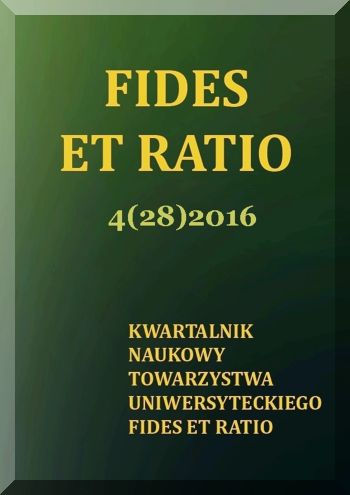Abstract
Even though religiousness and religious practices, as its manifestations, have been an object of research in social sciences for a long time, we know little about them with regard to parents of children with Autism Spectrum Disorder (ASD). One of the frequent features of autism is so-called challenging behavior, which significantly complicates the functioning of the child in the social context, including religious group behaviors. The aim of the present study was to explore the religious practices of parents whose children exhibit challenging behavior as well as the opinions of Catholic priests on selected aspects of the functioning of children with autism and their families in the church. The research problems comprise a number of issues not addressed before, such as parents’ reactions to the child’s challenging behavior in the church, the perceived reactions of other members of the congregation, preparing the child for participation in liturgy and services, as well as received and expected support from the Church. The participants were 60 parents of children with autism (30 mothers and 30 fathers) and 30 priests, mainly from the region of Subcarpathia, Poland. The collected research material provided data which make it legitimate to conclude that a majority of parents whose children exhibit challenging behavior during services decided to change their religious practices. An alarming finding is that most parents who take their children to church experience fear, which is usually a fear of comments from other members of the congregation regarding their child’s behavior. The results of the study may be useful not only for parents, but also for priests and therapists supporting families with a child with autism.
References
Carr, M. E. (2016). Self-management of Challenging Behaviours Associated with Autism Spectrum Disorder: A Meta-Analysis. Australian Psychologist, 51 (4), 316-333.
Coulthard, P., Fitzgerald, M. (1999). In God we trust? Organised religion and personal beliefs as resources and coping strategies, and their implications for health in parents with a child on the autistic spectrum. Mental Health, Religion & Culture, 2 (1), 19-33.
Ekas, N.V., Whitman, T.L., Shivers, C. (2009). Religiosity, Spirituality, and Socioemotional Functioning in Mothers of Children with Autism Spectrum Disorder. Journal of Autism and Developmental Disorders, 39 (5), 706–719.
Falk, N. H., Norris, K., Quinn, M. G. (2014). The factors predicting stress, anxiety and depression in the parents of children with autism. Journal of Autism And Developmental Disorders, 44 (12), 3185-3203.
Gosztyła, T., Gelleta, K. (2015). Marital quality and religiousness of couples parenting children with autism. Polish Journal of Applied Psychology, 13 (3), 41–52.
Gray, D. A. (2002). ‘Everybody just freezes. Everybody is just embarrassed’: felt and enacted stigma among parents of children with high functioning autism. Sociology of Health & Illness, 24(6), 734–749.
Krakovich, T., McGrew, J., Yu, Y., Ruble, L. (2016). Stress in Parents of Children with Autism Spectrum Disorder: An Exploration of Demands and Resources. Journal of Autism and Developmental Disorders, 46 (6), 2042-2053.
Lee, L., Harrington, R.A., Louie, B.B., Newschaffer, C.J. (2008). Children with Autism: Quality of Life and Parental Concerns. Journal of Autism and Developmental Disorders, 38 (6), 1147–1160.
Murphy, G. H., Beadle-Brown, J., Wing, L., Gould, J., Shah, A., Holmes, N. (2005). Chronicity of Challenging Behaviours in People with Severe Intellectual Disabilities and/or Autism: A Total Population Sample. Journal of Autism and Developmental Disorders, 35 (4), 405-418.
Purcell, H.N., Whisenhunt, A., Cheng, J., Dimitriou, S., Young, L.R., Gros-soehme, D. H. (2015). “A Remarkable Experience of God, Shaping Us as a Family”: Parents’ Use of Faith Following Child's Rare Disease Diagnosis. Journal of Health Care Chaplaincy, 21 (1), 25-38.
Rivard, M., Terroux, A., Parent-Boursier C., Mercier C., (2014). Determinants of stress in parents of children with autism spectrum disorders. Journal of Autism and Developmental Disorders, 44 (7), 1609-1620.
Tarakeshwar, N., Pargament, K.I. (2001). Religious Coping in Families of Children with Autism. Focus on Autism and other Developmental Disabilities, 16 (4), 247-260.
White, S. E. (2009). The Influence of Religiosity on Well-Being and Acceptance in Parents of Children with Autism Spectrum Disorder. Journal of Religion, Disability & Health, 13 (2), 104-113.
